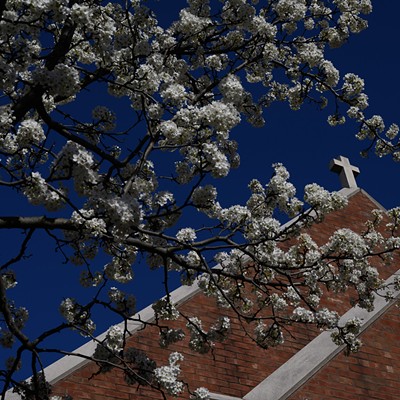Inside the entrance to Space gallery, where the exhibition Scale is currently on view, a small brownish-gray trading blanket covers a rectangle of floor. Items like a purse-sized bottle of Purell, a pack of confetti blasters, even a wrapped tampon lie on the fuzzy cloth. A handwritten cardboard sign encourages visitors to take what they need and leave something useful behind. It is here that viewers can find the exhibition's underlying theme: This show is just as much about creative DIY, and healthy interdependence, as it is about aesthetics or politics.
In an online statement, guest curator Ally Reeves, an instructor at Carnegie Mellon University, says that she is interested in "enabling, educating, and empowering." These concerns are unmistakable in Scale, which offers a multi-perspective consideration of practical survival in the face of turbulent economic conditions. Throughout the gallery, a cultural baseline is established -- a fresh mixing of familiar elements, where ingenuity, a barter economy, resourceful upcycling and unconditional freedom are championed. Here, it appears, is a resurgence of self-regulating, communal culture of the 1960s and '70s, but with a contemporary individualist spirit.
Reeves, an occasional City Paper contributor, features seven artists, many of whom rely on art sales for subsistence and offer their work at very reasonable prices. But just as significantly, work here also presents a strong current that counters society's conventional flood toward commercialism, economic dependency and partisan politics. Politics do form part of the show's message too, although the reference is oblique, unconventional and admonitory.
"Guffey Hollow," by an artist (or artists) operating under the same name, seems to be the exhibition's political anchor. The room-sized installation stands at one corner of the gallery, several paces behind Derk Wolmuth's "This Free Public Shower," a fully functioning bathing station made of materials from condemned Braddock houses.
Prefaced by a square of empty pint jars (referencing moonshine), "Guffey Hollow" is a loose interpretation of a noted McKees Rocks speakeasy, where Italian anarchists gathered in the years before and after McKinley's assassination. The walls are filled with newspaper facsimiles detailing violence committed against immigrants, including intimidation techniques enacted by gun-toting Klansmen. The installation is studded with other artifacts like dusty 45s, belt buckles and hooks for closing high-button shoes.
The effect is haunting. The mixture of period and contemporary music brings the installation out of the early 20th century and into the 21st, spurring visitors to consider contemporary parallels to the immigrant anarchists' plight. What similar oppositional forces do grassroots revolutionaries and independent thinkers now face?
Where "Guffey Hollow" achieves Reeves' desire to educate, installations by Heidi Tucker, Caleb Gamble and Teresa Foley reflect her attempt to empower. Tucker and Gamble make and sell tamales in a neatly painted rolling cart topped with a frayed, homemade umbrella lamp. Their installation is set up as a tableau, a salon-style floor-to-ceiling exhibition of Gamble's expressionist-flavored wood-block prints and Tucker's exquisite ink and gouache drawings. Unlike the art, a "tamale bar," made of hand-carved, bas relief corbels inked like woodblocks, is not for sale. (Neither is the cart itself.)
Meanwhile, Foley silkscreens caricatures of embarrassing Craigslist images (uploaded by men looking for women) onto totes, tank tops and women's T-shirts, selling them directly from the installed clotheslines onto which they are clipped like laundry.
Across the gallery, Gordon Kirkwood makes a Duchampian statement by elevating, for viewer consideration, items like an aged cycloidal gear-reducer; a much-used prosthetic leg; and a pale, lichen-covered horse skull. Like a Dadaist, he encourages a search for the abstract beauty within ordinary objects. Really, this is a purist's brand of upcycling: junk as objets d'art.
The show also contains an installation by filmmaker and inveterate drifter Bill Daniel.
In an era in which crafts are emerging as the nation's new cottage industry -- revealing creativity and personal autonomy as highly valued ideals -- the political and cultural implications of Scale help define a nascent contemporary ethos.
Scale continues through Feb. 6. Space, 812 Liberty Ave., Downtown. 412-325-7723 or www.spacepittsburgh.org















